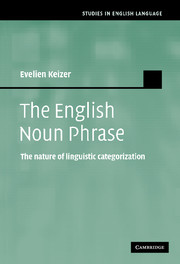Book contents
- Frontmatter
- Contents
- Acknowledgements
- 1 Introduction
- PART I The structural approach: possibilities and limitations
- 2 Headedness within the NP
- 3 Close appositions
- 4 Appositions with of
- 5 Binominals
- 6 Pseudo-partitive constructions
- 7 Sort/kind/type-constructions
- 8 Conclusion
- PART II The cognitive-pragmatic approach: some applications
- Bibliography
- Author index
- Subject index
3 - Close appositions
Published online by Cambridge University Press: 25 January 2010
- Frontmatter
- Contents
- Acknowledgements
- 1 Introduction
- PART I The structural approach: possibilities and limitations
- 2 Headedness within the NP
- 3 Close appositions
- 4 Appositions with of
- 5 Binominals
- 6 Pseudo-partitive constructions
- 7 Sort/kind/type-constructions
- 8 Conclusion
- PART II The cognitive-pragmatic approach: some applications
- Bibliography
- Author index
- Subject index
Summary
Introduction
This chapter deals with a number of very similar binominal expressions, often referred to in the literature as close appositions. The more general category of appositions, which has been the subject of an extensive amount of research, has proved quite difficult to define and, in the course of the debate, has come to include so many different constructions (e.g. Meyer 1992) that it is difficult to conceive of these constructions as constituting one category. This chapter is not, however, concerned with the question of which constructions should be called appositions and which not, although I agree with, among others, Acuña-Fariña (1996, 1999) that it is only useful to compare and capture under one label constructions which have a fair number of features (morpho-syntactic, semantic and/or pragmatic) in common. Instead, the discussion to follow will be restricted to a small subset of appositional constructions – a subset which is generally referred to as close or restrictive appositions and which consists of a number of binominal constructions which, formally as well as functionally, behave in an apparently unified manner.
Nevertheless, it is the aim of this chapter to demonstrate that there are, in fact, important syntactic, semantic and pragmatic differences even among these constructions, and that, although it may be justified to capture them all under the general heading of close apposition, we are really dealing with a number of subtypes, given in (1).
- Type
- Chapter
- Information
- The English Noun PhraseThe Nature of Linguistic Categorization, pp. 22 - 60Publisher: Cambridge University PressPrint publication year: 2007



